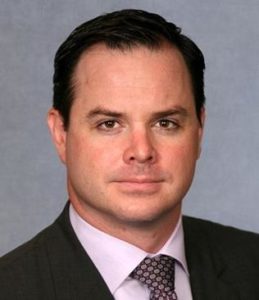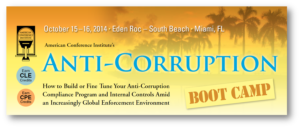 Recently, as the World Cup captured the attention of sports fans around the world, host country Brazil was also busy receiving interest from companies seeking opportunities there. Before a U.S. company sets up shop in that or any other Latin American country, it must first establish a compliance program to avoid running afoul of the Foreign Corrupt Practices Act, or FCPA.
Enacted in 1977, the FCPA applies to companies and individuals in the United States, as well as foreign companies that participate in U.S. securities markets. The Act makes it illegal for a person or company to make corrupt payments to a foreign official in order to obtain or retain business.
Failure to comply with the Act can result in fines, whistle-blower awards, prison sentences and damage to a company’s reputation. In April, Hewlett-Packard was accused of making illegal payments to a government official, and offered to pay $108 million to the SEC to resolve the charges.
Using cash or gifts to obtain a building permit approval or win a government contract violates the FCPA. The problem lies in countries where payoffs are expected. Latin American countries occupy some of the lowest spots in the Corruption Perceptions Index 2013 from Transparency International. Among 177 countries, Haiti ranks 163rd, Venezuela 160th and Paraguay 150th.
In lower-ranked countries, U.S. companies need stronger safeguards to avoid bribery and kickback schemes. Companies should first conduct a risk assessment:
• What forms of direct and indirect contact do employees and subsidiaries have with government officials and state-owned enterprises?
• How and when are local consultants, agents and distributors hired, and what are they expected to accomplish?
• Are there incidents of past or ongoing noncompliance with the Act?
When entering a Latin American country, engage a local agent or attorney to work with your U.S. anti-corruption counsel. If you are thinking about Brazil, know what local politicians are expecting in the wake of the World Cup excitement.
American companies should be particularly vigilant in high-risk industries, including construction, energy and healthcare.
Latin American countries pose particular dangers. In those ranked low by Transparency International, anti-corruption laws are not enforced. Government agencies hold monopolies, family members of government officials act as go-betweens, and public bids are rigged.
How does a company deal with these risks? Through strong internal controls, accountability and compliance.
A corporate compliance program should be established with two components. The first aims to prevent corrupt practices through:
• A clearly written policy in English and the local language that spells out: corporate rules, how relationships with third parties are to be structured; and specific guidelines for gifts, travel and entertainment.
• Education and training, including training of business partners.
• Due diligence in selecting business partners, agents and consultants.
• Monitoring by senior executives.
• Accurate financial record-keeping.
• Periodic audits in high-risk markets.
The second component detects and reports incidents through an internal whistle-blower hotline, regularly scheduled reviews of operations, and continuing education. The latter is part good business, part damage control. If an internal review discovers a potential violation, U.S. enforcement authorities look more kindly on corporations that take active efforts to root out internal corruption and self-report it when discovered.
Lapses may be impossible to avoid, but they can limited and immediately remediated with an active compliance program. That, in turn, can make a business venture into Latin America a gainful, not hurtful, experience.
Matthew will speak at ACI’s Inaugural Miami Anti-Corruption Boot Camp, October 15-16, 2014:
How to Prepare Your Team for an Internal Investigation? How to Thoroughly Scope Your Action Plan to Avoid Common Pitfalls and Costly Mistakes
To learn more about the event click on the image below:
Recently, as the World Cup captured the attention of sports fans around the world, host country Brazil was also busy receiving interest from companies seeking opportunities there. Before a U.S. company sets up shop in that or any other Latin American country, it must first establish a compliance program to avoid running afoul of the Foreign Corrupt Practices Act, or FCPA.
Enacted in 1977, the FCPA applies to companies and individuals in the United States, as well as foreign companies that participate in U.S. securities markets. The Act makes it illegal for a person or company to make corrupt payments to a foreign official in order to obtain or retain business.
Failure to comply with the Act can result in fines, whistle-blower awards, prison sentences and damage to a company’s reputation. In April, Hewlett-Packard was accused of making illegal payments to a government official, and offered to pay $108 million to the SEC to resolve the charges.
Using cash or gifts to obtain a building permit approval or win a government contract violates the FCPA. The problem lies in countries where payoffs are expected. Latin American countries occupy some of the lowest spots in the Corruption Perceptions Index 2013 from Transparency International. Among 177 countries, Haiti ranks 163rd, Venezuela 160th and Paraguay 150th.
In lower-ranked countries, U.S. companies need stronger safeguards to avoid bribery and kickback schemes. Companies should first conduct a risk assessment:
• What forms of direct and indirect contact do employees and subsidiaries have with government officials and state-owned enterprises?
• How and when are local consultants, agents and distributors hired, and what are they expected to accomplish?
• Are there incidents of past or ongoing noncompliance with the Act?
When entering a Latin American country, engage a local agent or attorney to work with your U.S. anti-corruption counsel. If you are thinking about Brazil, know what local politicians are expecting in the wake of the World Cup excitement.
American companies should be particularly vigilant in high-risk industries, including construction, energy and healthcare.
Latin American countries pose particular dangers. In those ranked low by Transparency International, anti-corruption laws are not enforced. Government agencies hold monopolies, family members of government officials act as go-betweens, and public bids are rigged.
How does a company deal with these risks? Through strong internal controls, accountability and compliance.
A corporate compliance program should be established with two components. The first aims to prevent corrupt practices through:
• A clearly written policy in English and the local language that spells out: corporate rules, how relationships with third parties are to be structured; and specific guidelines for gifts, travel and entertainment.
• Education and training, including training of business partners.
• Due diligence in selecting business partners, agents and consultants.
• Monitoring by senior executives.
• Accurate financial record-keeping.
• Periodic audits in high-risk markets.
The second component detects and reports incidents through an internal whistle-blower hotline, regularly scheduled reviews of operations, and continuing education. The latter is part good business, part damage control. If an internal review discovers a potential violation, U.S. enforcement authorities look more kindly on corporations that take active efforts to root out internal corruption and self-report it when discovered.
Lapses may be impossible to avoid, but they can limited and immediately remediated with an active compliance program. That, in turn, can make a business venture into Latin America a gainful, not hurtful, experience.
Matthew will speak at ACI’s Inaugural Miami Anti-Corruption Boot Camp, October 15-16, 2014:
How to Prepare Your Team for an Internal Investigation? How to Thoroughly Scope Your Action Plan to Avoid Common Pitfalls and Costly Mistakes
To learn more about the event click on the image below:
View all upcoming Anti-Corruption/FCPA events around the world, click here.
